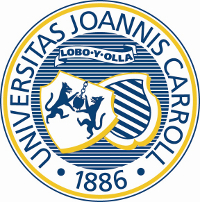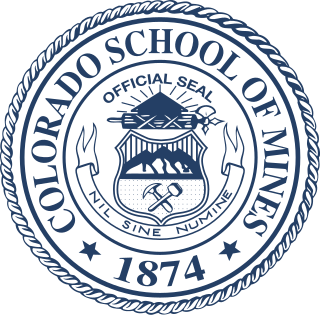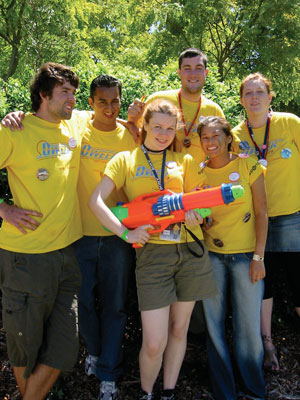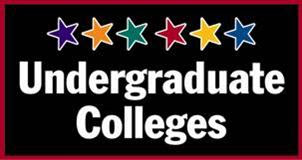Related Research Articles

John Carroll University (JCU) is a private Jesuit university in University Heights, Ohio, United States. Located in a suburb of Cleveland, it is primarily an undergraduate, liberal arts institution composed of a college of arts and sciences and business school. The university enrolls approximately 3,000 undergraduate and graduate students as of fall 2024. Founded in 1886 as St. Ignatius College, it was renamed in 1923 after John Carroll, the first Catholic bishop in the United States.

Colorado School of Mines (Mines) is a public research university in Golden, Colorado founded in 1874. The school offers both undergraduate and graduate degrees in engineering, science, and mathematics, with a focus on energy and the environment. While Mines does offer undergraduate minor programs in the humanities, arts, and social sciences, it only offers degree programs in STEM fields, with the exception of economics. In the Fall 2023 semester, the school had 7,101 students enrolled, including 5,443 undergraduate and 1,658 graduate students. The school has been coeducational since its founding, but enrollment remains predominantly male. It is classified among "R1: Doctoral Universities – Very high research activity".

The College Preparatory School is a four-year private non-residential high school in Oakland, California. The school's motto is Mens Conscia Recti, a Latin phrase adapted from Virgil's Aeneid that means "a mind aware of what is right".

Loyola University Maryland is a private Jesuit university in Baltimore, Maryland. Established as Loyola College in Maryland by John Early and eight other members of the Society of Jesus in 1852, it is the ninth-oldest Jesuit college in the United States and the first college in the United States to bear the name of St. Ignatius of Loyola, the founder of the Society of Jesus.

The Eleanor Roosevelt College is one of seven undergraduate colleges at the University of California, San Diego. While ERC has students of all majors, the college emphasizes international understanding in its co-curricular programming and general education requirements, requiring students to complete the Making of the Modern World history and writing program, a regional specialization, and demonstrate basic proficiency in a foreign language.

The Virginia Tech Corps of Cadets (VTCC) is the military component of the student body at Virginia Polytechnic Institute and State University. Cadets live together in residence halls, attend morning formation, wear a distinctive uniform, and receive an intensive military and leadership educational experience similar to those at the United States service academies. The Corps of Cadets has existed from the founding of the university as the Virginia Agricultural and Mechanical College in 1872 to the present-day institution of Virginia Tech, which is designated a senior military college by federal law. As of August 2024, about 1,300 cadets are currently enrolled in the program.
King University is a Presbyterian-affiliated private university in Bristol, Tennessee, United States. Founded in 1867, King is independently governed with covenant affiliations to the Presbyterian Church (USA) and the Evangelical Presbyterian Church (EPC).

North Carolina Wesleyan University (NCWU) is a private Methodist university in Rocky Mount, North Carolina. It was founded in 1956. North Carolina Wesleyan offers courses at its main Rocky Mount campus, as well as satellite locations in Brunswick, Durham, Goldsboro, Greenville, Manteo, New Bern, Raleigh, Washington, Wilmington and Winston-Salem.

The University of Virginia's College at Wise is a public liberal arts college adjacent to Wise, Virginia. It is part of the University of Virginia, though separately accredited, and was established in 1954 as Clinch Valley College of the University of Virginia.

Student orientation or new student orientation is a period before the start of an academic year at a university or tertiary institutions. A variety of events are held to orient and welcome new students during this period. The name of the event differs across institutions. Post-secondary institutions offer a variety of programs to help orient first year students. These programs can range from voluntary community building activities to mandatory credit-based courses designed to support students academically, socially, and emotionally. Some of these programs occur prior to the start of classes while other programs are offered throughout the school year. A number of research studies have been done to determine the factors to be considered when designing orientation/transition programs.
Williams–Mystic, the Ocean and Coastal Studies Semester of Williams College and Mystic Seaport Museum, is an interdisciplinary semester program based at the Mystic Seaport Museum in Mystic, Connecticut.

Dearborn Center for Math, Science and Technology (DCMST) is a specialized secondary education center with a four-year advanced, research-based, science and math curriculum located in Dearborn Heights, Michigan. The school was founded in 2001, with its first graduating class in 2005. Most of the school is located in the Henry Ford Community College building, but some of the Michael Berry Career Center (MBCC) building is also used by DCMST. About 75 students are selected each year from the three high schools in the Dearborn City School District. Once in the program, students are committed for four years. In freshman and sophomore years, students attend their three classes at DCMST in the afternoon from 11:15 to 1:55. Juniors and seniors attend in the morning from 7:35 to 10:15. The other three hours are spent at the student's home school. DCMST is a member of the NCSSSMST, an alliance of specialized high schools in the United States whose focus is advanced preparatory studies in mathematics, science, and technology. The school is also accredited by the North Central Association (NCA) as all other Dearborn Public Schools are.[citation needed]

A freshman, fresher, first year, or colloquially frosh, is a person in the first year at an educational institution, usually a secondary school or at the college and university level, but also in other forms of post-secondary educational institutions.
University student retention, sometimes referred to as persistence, is a process to improve student graduation rates and decrease a loss of tuition revenue via university programs.

Wyoming Catholic College (WCC) is a private Catholic college in Lander, Wyoming, United States. WCC is the only Catholic college or university in the state. It is notable for its extensive outdoor education program, requiring all freshmen students to complete a 21-day backpacking trip, and engage in other outdoor activities while studying a great-books academic curriculum.
Purpose-guided education prioritizes intrinsic motivation and helps students become more engaged in learning experiences through connecting their beliefs and life goals to curricular requirements. Jerry Pattengale first coined the phrase "purpose-guided education", and began its usage at Indiana Wesleyan University in 1997. The graduation rates increased over 20% over the following ten years, and ensuing publications, collaborative research projects, and other scholarly activities gained national attention. The Center for Life Calling and Leadership is perhaps the most visible manifestation of this educational philosophy. Key books include Why I Teach, The Purpose-Guided Student, The Explorer's Guide, and the basic thesis of Educating Students Purposefully. Pattengale began questioning aspects of the prevailing approach to student success, as noted in "Student Success or Student Non-Dissatisfaction". Through surveying over 400 institutions he discovered that over 90% of them based their student success approach on student satisfaction surveys and external issues instead of intrinsic motivation. The original usage of this student success approach is found in The Purpose-Guided Student.
Dr. Cassandra Bolyard Whyte is an American higher education administrator, teacher, and educational researcher. She has been recognized for publication and leadership in the areas of higher education management, improving academic performance of students, campus planning and safety, predicting educational trends in colleges and universities, and encouraging creativity in curriculum development. She is also experienced in helping facilitate campus architectural planning to meet educational vision and programming, as well as higher education human resource management and motivation.
The International Mentoring Program (IMP) is a student-based program at Brown University that offers social, academic, and educational support to incoming international students. The aim of the IMP is to assist incoming students in their transition to Brown University and the United States by providing each student with a mentor who provides advice and acts as a resource to them. These mentors are upper classmen who communicate with the international students throughout the academic year to offer support to the new students in their transition.

The University of North Georgia (UNG) is a public senior military college with multiple campuses in Georgia, United States. It is part of the University System of Georgia. The university was established on January 8, 2013, through a merger of North Georgia College & State University and Gainesville State College. Campus locations include Dahlonega, Oakwood, Watkinsville, Blue Ridge, and Cumming.

Stony Brook University has an undergraduate population of around 15,000 students. To create a sense of community, the Undergraduate Colleges of Stony Brook University were developed. These Undergraduate Colleges function as smaller communities within the larger university and are themed to provide an academic aspect to each student's interests. Notable programs offered include first-year advising, UGC-themed events, and smaller seminar courses.
References
- ↑ "Project Renaissance Program," SUNY Albany website. Archived December 22, 2006, at the Wayback Machine
- ↑ Bigger, Jessica. "Improving the Odds for Freshman Success". Nacada Clearinghouse. Retrieved 27 January 2017.
- 1 2 3 "Our History," University of South Carolina National Resource Center for The First-Year Experience and Students in Transition website. Accessed June 2, 2015.
- 1 2 "Colby Outdoor Orientation Trips," Colby College website. Accessed June 2, 2015.
- ↑ "PRP Archive," Archived 2015-07-13 at the Wayback Machine University of Pennsylvania website. Accessed June 2, 2015.
- ↑ "Freshman Seminar Program," UC Irvine website. Accessed May 28, 2015.
- ↑ "University 101 Programs," University of South Carolina website. Accessed May 28, 2015.
- ↑ Hutson, B.L; Atwood, J.A. (November 2006). "Outcome evaluation to support freshman orientation program."
- ↑ Bigger, Jessica. "Improving the Odds for Freshman Success". Nacada Clearinghouse. Retrieved 27 January 2017.